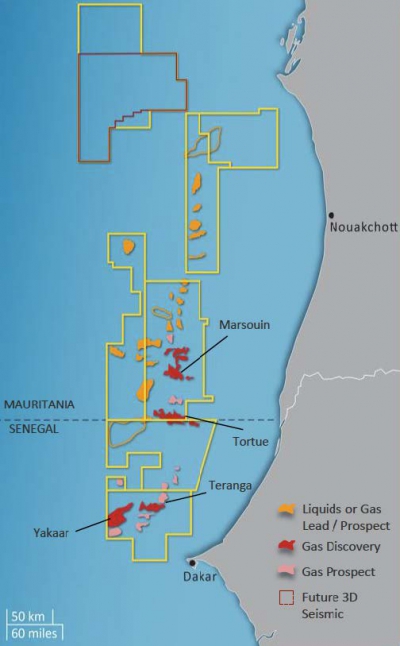[NGW Magazine] Senegal: Star of 2017 World Discoveries
Last year was a successful one for explorers. Most large finds were oil, but the largest of all was a gas discovery offshore northwest Africa.
Kosmos’s Yakaar gas find offshore Senegal turned out to be the star discovery of 2017, with the other major finds being oilfields. The US independent’s exploration chief Brian Maxted said May 2017, when announced, that Yakaar-1 – with its gross P-mean gas resource of 42.5bn m³ (15 trillion ft³) and a ratio of some 15 to 30 barrels of condensate per mn ft³ – was “the largest hydrocarbon find in the world so far in 2017.” And so it remained.
At 2.6bn barrel of oil equivalent, the Kosmos/BP ultra-deepwater Yakaar find was “the largest discovery of 2017 by far,” UK-based consultancy Wood Mackenzie said earlier this month
WoodMac said February 6 that the upstream industry globally had “achieved significant success in 2017 as companies emerged from the downturn leaner and more focused on making smart portfolio decisions – making a return to high-impact exploration in ultra-deepwater and frontier basins after a period of focusing on low-risk, low-reward activity.”
Oil accounted for 56% of discovered volumes globally, a share last seen in 2008, with eight out of the top 10 discoveries being oil weighted, said WoodMac. Its head of exploration research Andrew Latham said exploration added over 12bn boe conventional new field volumes in 2017.
“Explorers invested only around $40bn in conventional exploration and appraisal, down from $95bn in 2014,” said Latham, noting that they focused on making high-impact frontier finds with a good chance of early commercialisation.
Resource discovery costs were the same as 2016 ($2.15/boe) and slightly better than the ten-year average of $2.25/boe. Assuming a similar level of resource creep for 2017, Wood Mackenzie expects discovery costs will ultimately be around $1.60/boe, the lowest level since 2011. Latham added: “Exploration well success rates of 36% are the highest since 2013. Operators are being rewarded for refocusing their portfolios and high-grading prospects.
“2017 looks like the most profitable year for the oil and gas exploration sector since 2010,” he added.
Six giant (greater than 500mn boe) and 15 large (100mn-500mn boe) discoveries were made in 2017, according to WoodMac. These accounted for 78% of total discovered resources. Apart from Yakaar, they were all oil and included Zama (Mexico), Whale (US Gulf) and Horseshoe (Alaska) and Eridu (Iraq).
BP at its 2017 results presentation February 6 said that it now envisages two floating liquefaction (FLNG) hubs offshore Senegal/Mauritania with Kosmos: the first is Tortue (Mauritania), then later one will be based on Yakaar (Senegal) – for which it said appraisal work has been submitted but would take some time. BP said it is working (with Kosmos) on pre-front-end engineering and design for Tortue floating liquefaction (FLNG) venture on which it hopes to take a final investment decision (FID) in the next 12 months or so, with LNG start-up by late 2021.
That new FID target date is later than the 2018 target outlined six months earlier by Kosmos. However, BP is sticking with 2021 as its target for first gas.
Luck running out
However the flipside of high-impact exploration is that risks don’t always lead to rewards. After six consecutive gas finds from six wells between 2015 and early 2017, Kosmos has in the past seven months drilled three dry or uncommercial holes in succession offshore Senegal/Mauritania, as it pursued its hunch that huge oil resources lie in the further margins of its acreage.
First, Hippocampe (Mauritania block C-8) in October, then Lamantin (Mauritania block C-21) in December 2017 and Requin Tigre-1 (Senegal’s Saint Louis Offshore Profond block) in January 2018 have disappointed. Many of the drilling costs in these three wells were carried by BP, under the $1bn-plus partnership deal the duo agreed in late 2016. Kosmos though insists it “believes there is substantial remaining prospectivity" in its large acreage position
However, presenting BP's strategy update February 6, senior executives talked up the ability of their supercomputers' processing power, which had doubled over the year. It had enabled proprietary imaging technology to discover reserves, such as another 200,000 b/d reserves at the Atlantis field in the Gulf of Mexico. Overall Kosmos CEO Andrew Inglis said: "Discoveries to date of 40 trillion ft³ gross, at a net cost of $0.20/boe [to Kosmos] benefiting from the ‘partner carry’ by BP, had “created the potential for two world-scale LNG hubs.
Yakaar and previous gas discoveries by Kosmos

Map credit: Kosmos Energy
Under the partnership, Kosmos continues to lead the exploration campaign in the region, while BP leads planned FLNG developments. BP also has the larger equity position in each of the offshore blocks listed in their agreement.
The duo’s partnership seems to be harmonious: as well as buying into Kosmos blocks in both Senegal and Mauritania, the pair agreed to work together if they enter The Gambia and, in January 2018, secured two joint exploration blocks in Sao Tome e Principe in offshore blocks 10 and 13 (where Kosmos already operates blocks 5, 11 and 12 and has an interest in Portugal’s Galp-run block 6).
Kosmos said February 6 it has refinanced its reserve based lending (RBL) facility. This previously covered only its Ghana assets, but now includes recently-acquired producing assets in Equatorial Guinea (from Hess) “as well as allowing the company the future flexibility to include the Greater Tortue development post final investment decision.” The US independent said the RBL’s structure includes a feature that allows the facility size to be increased up to an extra $500mn, at the company’s discretion.
Thus the borrowing capacity has been increased to $1.5bn, from $1.3bn; date of maturity has been extended by four years to March 31, 2025; while amortisation is extended by four years to March 31, 2022. “The financing, which was oversubscribed, saw strong appetite from both new and existing banks,” said Kosmos CFO Thomas Chambers.
Mark Smedley



